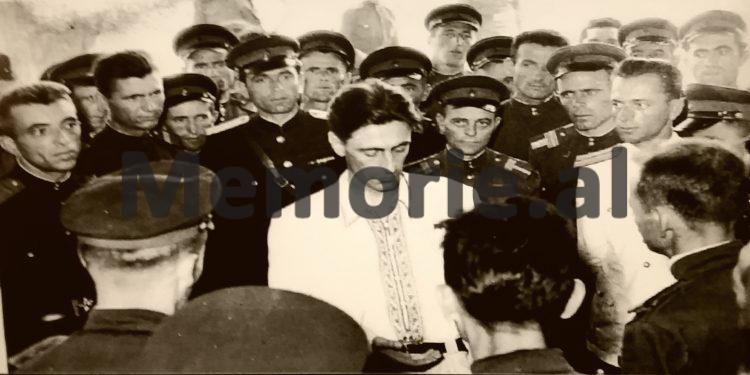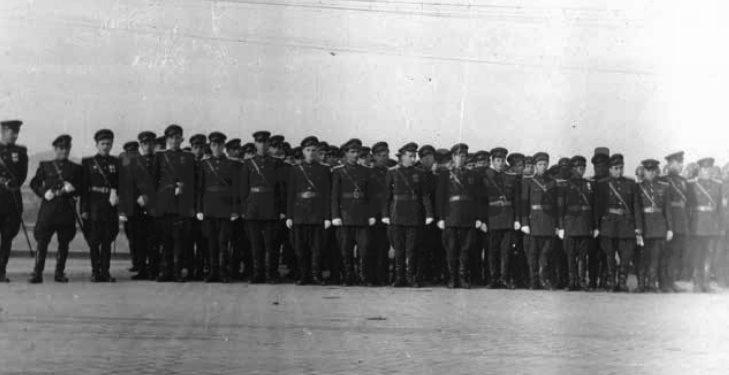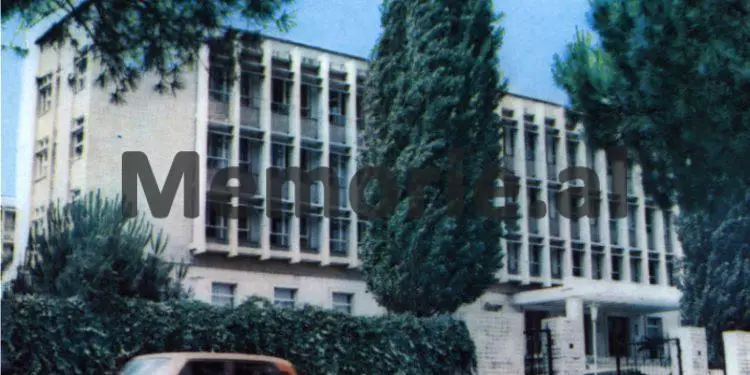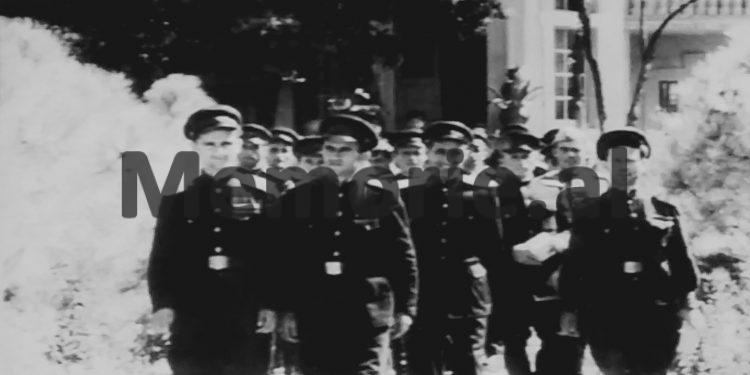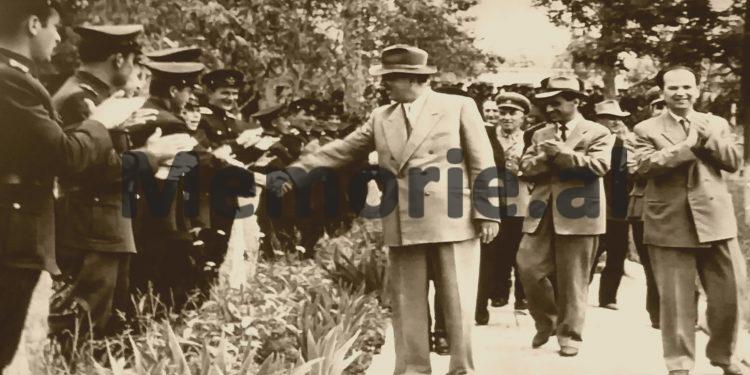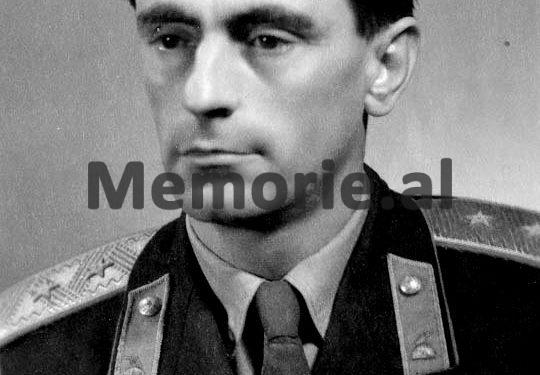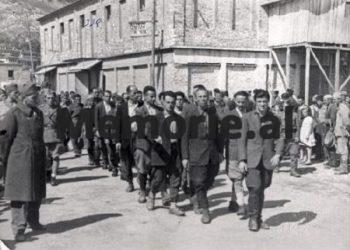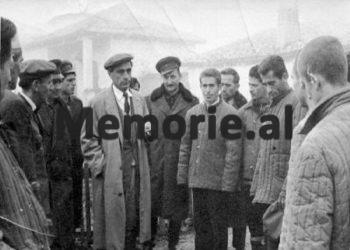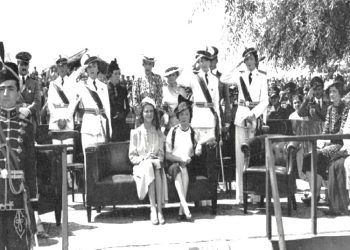Memorie.al publishes two archival documents issued by the Central State Archive (fund 14. Apparatus of the former Central Committee of the ALP) which bear the logo “Top secret” and belong to the dates 4 January and 7 February 1966, where the Minister of Internal Affairs, Lieutenant General, Kadri Hazbiu, through a report, informs the First Secretary of the Central Committee of the ALP and at the same time the General Commander of the Armed Forces of the People’s Republic of Albania, Enver Hoxha, regarding with the cuts that were planned to be made in the staff of the staff of the Ministry of Internal Affairs, where 1915 servicemen were released, who by that time had served in that department. All the details of the report of the Minister Kadri Hazbiu, since the restructuring of the digester that he headed based on the respective directorates, where the most delicate were those of Political Intelligence from abroad, as well as those of Counterintelligence (State Security Directorate), by they would depend after that, until the systematic work of all the effectives who were released.
“The cuts reach a total of 1915 people in all organs and departments. Of these 850 officers, 652 non-commissioned officers and police, 118 civilians and others soldiers. The figure 1915 represents 16 percent of the effective, while 870 officers who are laid off, 25.5 percent above the organic limit and 24.5 percent above the effective officer (this is explained that by special order, we keep above the limit of 100 or some officers who are available). Of the 1915 redundancies, 555 or 29 percent could be considered fugitives by 5/2/1966. Except for the 115 trainees who passed the Ministry of People’s Defense, all the others went to production and a good part to agricultural cooperatives (in villages and farms. There is a strong resistance, especially in the countryside. The women and relatives of cadres, who constantly put negative pressure”.
This is stated, among other things, in two archival documents issued by the Central State Archive (fund 14, of the former Central Committee of the ALP), where there are two reports which bear the initials “Top secret” and belong to the dates of January 4 and February 7, 1966, where the Minister of Internal Affairs, Lieutenant General, Kadri Hazbiu, informs the first secretary of the Central Committee of the ALP and at the same time the General Commander of the Armed Forces of the People’s Republic of Albania, Enver Hoxha, regarding with the cuts that were planned to be made in the staff of the staff of the Ministry of Internal Affairs, where 1915 soldiers were released, who until then had served in that department. But which were the relevant directorates where they had served up to that time effectively and where would they be systematized afterwards? How had the two most delicate directorates of the Ministry of Internal Affairs, such as Counterintelligence (State Security) and Foreign Political Intelligence, functioned until then, and how was their reorganization planned after drastic cuts in the staff of its staff? For all these and others, we know the two relations in question, where in addition to Enver Hoxha who approved them, the opinion of Prime Minister Mehmet Shehu, Hysni Kapos (who at that time covered in party streets as secretary of the Central Committee, the bodies of the ‘Dictatorship of the Proletariat’), Rita Markos, Beqir Balluku, Minister of People’s Defense and Behar Shtylla, Minister of Foreign Affairs.
“Top Secret” Report of the Minister of Interior, Lieutenant General, Kadri Hazbiu
Top secret
Tirana, January 4, 1966
ON THE DISPLACEMENT OF A NUMBER OF DISCOVERY FRAMEWORKS IN THE MINISTRY OF FOREIGN AFFAIRS
- To direct all the intelligence-operational work of intelligence that takes place through residences at our diplomatic missions in the Ministry of Foreign Affairs and in the Ministry of Foreign Trade, to deploy a number of Intelligence cadres headed by a senior cadre, of appointed Deputy Minister of Foreign Affairs.
- The Deputy Minister of Foreign Affairs, who also directs the work of Intelligence, has dual relations with the Ministry of Internal Affairs, for the tasks that are in the competencies of the Ministry of Internal Affairs.
- The Intelligence Framework, according to the needs, is placed in different sectors of the Ministry of Foreign Affairs and performs intelligence and competence tasks of the Ministry of Foreign Affairs and is responsible respectively for both sectors.
- The number of Reconnaissance staff to be placed in the Ministry of Foreign Affairs is 20 people. As the framework and tasks expand, it becomes necessary to make some changes in the structures of the Ministry of Foreign Affairs.
- For the circulation of staff and to maintain the work profile, it is necessary to create a reserve in the staff of the Ministry of Foreign Affairs.
- The personnel policy, both inside and outside, is made by the Ministry of Foreign Affairs. In case the need arises for the Intelligence staff to change the profile of their work, the relevant decision is taken based on an agreement between the two ministries.
- The economic treatment of the Reconnaissance staff will be according to the functions they perform, the same as for all the staff of the Ministry of Foreign Affairs.
For example, in these structures, the Army intelligence services should be performed by introducing one or several cadres of this profile.
Comrade Beqir, Comrade Behar and I agree with the above proposals.
MINISTER OF INTERNAL AFFAIRS
Lieutenant
KADRI HAZBIU
Enver’s note: “I agree with these things, talk to friends and decide”
Comrade Hysni, I agree with this, I can have a short conversation with Kadri, Mehmet, Beqir and Rita, and decide and report as soon as possible.
Kana
He talked to Beqiri, Rita, Kadri, Hysni, Beqiri talked to Mehmet, he showed reservations about point 8.
We all agree. For point 8, Beqiri was assigned to talk to Mehmet.
For point 9, I thought of having an investigator, look and where it should depend.
8.II.1968
Kadri Hazbiu’s second report: “We took a considerable part of the Security staff to the Farms and Agricultural Cooperatives”.
THE PEOPLE’S REPUBLIC OF ALBANIA
MINISTRY OF INTERNAL AFFAIRS “VERY SECRET”
TIRANA Ex. Nr.
Tirana, on 7/2/1966
SOME ISSUES THAT SHOULD BE RESOLVED AS SOON AS POSSIBLE IN THE MINISTRY OF INTERNAL AFFAIRS
For information
– So far, we have pre-processed the structure and staff, and it turns out that:
- The cuts reach a total of 1915 people in all bodies and departments. Of these 850 officers, 652 non-commissioned officers and police, 118 civilians and others soldiers.
The figure 1915 represents 16 percent of the effective, while 870 officers who are laid off, 25.5 percent above the organic limit and 24.5 percent above the effective officer (this is explained that by special order, we keep above the limit of 100 or some officers who are available).
- From the cut of 1915 people, 555 people or 29 percent of them can be considered as refugees until 5/2/1966.
Except for the 115 trainees who passed the Ministry of People’s Defense, all the others have gone into production and a good part into agricultural cooperatives (in villages and farms)
There is a strong resistance, especially in the village. A big obstacle becomes women and relatives of cadres, who constantly put negative pressures.
- The final processing of the organic, will give believe cuts even more. In the central apparatus the cuts are stronger. With the exception of some sectors that deal directly with operational work, in what we call the apparatus, the cuts are more sensitive. They range from 50 to 80 percent.
Over all the staff of the Ministry (in the center), including the sectors that deal with direct operational work, so far it comes out with the variant of reduction 30-32 percent, but this percentage will increase even more.
of secondment
Issues to be resolved now for urgent procedure both in final staffing and staff distribution.
These issues have been discussed with us and are proposed to be removed from both the functions of the Ministry of Internal Affairs and its staff.
- The entire system of guarding economic facilities with military guards (soldiers and police) including state reserves. Generally, the guards, to be civilians and to enter their own organics of the facilities. Arming and instruction for service, to be done by the bodies of the Ministry of Internal Affairs. If such an object is to be guarded by military force, this will be done by soldiers and not by police.
- The Party Committees and the Executive Committees should not be guarded by police, but by civilian guards, so that they can have them in the staff. The bodies of the Ministry of Internal Affairs in organizing the service for maintaining order, will definitely have in the center of attention these committees.
- The fire service, together with the means and people, to be separated from the Ministry of Internal Affairs. It should be taken by the Executive Committees and the municipal sections and in the center by the Ministry of Municipal Economy.
- The civil status that so far depends on the Ministry of Internal Affairs as well as the Passport system (for those functions that remain), to be separated from the system of the Ministry of Internal Affairs, passing all, in terms of Executive Committees.
- The Auto Inspectorate, with the functions of issuing and revoking patents, as well as any other function that may be assigned to it, should be removed from the system of the Ministry of Internal Affairs, as a service that does not belong to it. Ministry of Internal Affairs to exercise control functions over traffic rules, and nothing else. Do not even deal with ticket control or vehicle control discipline. The Auto Inspectorate, if it cannot be held directly by the Prime Minister, to pass to the Ministry of Communications.
- State figure (its production with the full range of rules) to be removed from the system of the Ministry of Internal Affairs. This service should be dependent on the Prime Minister, for its important function. He can also be charged with the system of production of official stamps, control of secrecy in the state administration, etc., functions that until today have been performed unjustly by the bodies of the Ministry of Internal Affairs. For the effects of secession from the Ministry of Internal Affairs all these services will be removed (by transfer) from its effective 1105. And will put the Ministry of Internal Affairs, in its rightful role, not allowing it to perform over-departmental functions.
- To approve the subordination of the border by the heads of the Branches of Internal Affairs, preserving the current structures of the battalions. Also, for the effect of the work of the Party, to depend on the Party Committees of the districts where they are deployed. This dependence is possible and necessary, because it not only strengthens the work as a whole, but also provides significant reductions in the boundary staff of the respective Internal Affairs Branches for some functions, liquidates the two sector commands that are today, and facilitates the staff of the Border Directorate of the political apparatus in the center.
- The Overseas Intelligence Service apparently has organizational flaws. I think that this service should be identified in a single body (for both the Ministry of National Defense and the Ministry of Internal Affairs), depending on the Defense Council. The Ministry of Internal Affairs can carry out imminent intelligence across the border, as well as by using internal opportunities for gathering information. It must meet the needs of this superior intelligence body of the Republic, which in the entirety of its purpose, must do a deeper and more comprehensive work. If this proposal is not seen properly, then it should be decided on the study that we have presented to merge in the structure of the Ministry of Foreign Affairs, the Intelligence service that is performed through legal channels (our representations abroad).
- To decide whether or not a single investigative body will be established, as well as its subordination. Our reasons for this are well known.
MINISTER OF INTERNAL AFFAIRS
Lieutenant
KADRI HAZBIU




